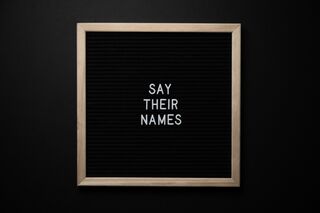Memory
Having Trouble Remembering Names? Try Training Your Memory
Memory lapses are very annoying but luckily we can do something about them.
Posted February 28, 2021

It’s very embarrassing to forget somebody’s name, but most of us do it either now and then or, worse, fairly regularly. If we’re, how shall I put it, getting on a bit, there’s the additional worry that we are losing it, or maybe even showing the first signs of dementia. Even if we’re not suffering from memory loss, could this possibility have crossed other people’s minds?
I know all about this problem, as I am not at all good at remembering names myself. The saving grace in my case, if that’s what it is, is that I have always been poor at this particular life skill. So I will strongly refute any suggestion that I’m just getting old! I’m not one who likes to brush things off by saying I’m having a senior moment.
And I feel somewhat vindicated after reading a rather reassuring report that outlines how memory loss routinely affects those who are, well, young. A recent article in CNS Spectrums reports how researchers at the University of Edinburgh found that more than 1 in 3 adults, in a group of 124 with an average age of 27, thought their memory had got worse over the previous five years, and well over half were afraid of developing dementia. Memory lapses, over things such as where they’d put their keys or their phone, why they’d gone into a particular room, or what was on their shopping list, were just as frequent among those in their 20s as those in their 50s.

Of course, that’s all very well and it doesn’t really make us feel much better when we fail to put a name to a face. Instead we may well feel it’s the moment to slip away if we suspect we’re about to be called upon to do the introductions. Just thinking about it is a nightmare. So why does it happen and is there anything we can do about it?
We rely enormously on our memory in our everyday life, whether it’s for things in our long-term memory, the medium-term, or the short-term. Recency isn’t of the most importance, as we may well remember an event from many years past but not recall what happened yesterday. The memory is a complex processor about which there is a massive literature outlining theories and research.
Suffice it to say that three key factors affecting the things we remember are how we take in or encode a piece of information, the consolidation or way this information is processed cognitively, and how it is retrieved or recalled. And the good news is that there are things we can do to help ourselves, especially at the first and third of these three stages.
Sticking to the question of names, the first thing is to make sure we have properly registered what somebody is called. So, if we haven’t heard or aren’t quite sure, we should just ask. Next, it is a good idea to use the name in conversation a couple of times if possible to make sure we’ve really got it. If we’ve never grasped a person’s name, how can we be expected to remember it?
The main point here is that it is crucial to pay initial attention to the things we want to remember later. When my partner and I are out for a walk, he may ask me after we’ve passed somebody, how old I think they are. I have to admit that I can’t remember as I’d been much too busy thinking about their jacket or their trainers! The moral is that if remembering somebody’s name is the aim, we must pay it a bit more than fleeting interest.
Dominic O’Brien, the British mnemonist and eight times World Memory Champion, is among those to advocate conjuring up an apt and memorable image as the next step. According to O’Brien, drawing on associations between the person and the image, placing the mental image in a particular setting, and making the image as bizarre and colourful as possible, will all aid recall.

Everybody has to devise their own mnemonics or aides-memoires for them to work, but a few of my own might be the following. If I were just going on the name itself, Iris Gray (not a reader’s name, I hope) might make me think of a grey cat with bright shiny eyes. And maybe Joan Rushmore could suggest Joan of Arc sitting among past presidents.
Or if I were to link a person’s name to the context in which we meet, I might come up with an image of a brown towel at the poolside for Terry Brown at the swimming club, or a Knave of Spades sweeping up maple leaves for Jack Maplethorpe at the garden centre.
Of course, some names are harder to turn into images than others. Maybe in these cases, the name can be linked to other people we know. For instance, I might make a mental note about Paula Cooper by thinking of my cousin Paula holding hands with our neighbour Mr. Cooper (if I had one).
This however raises an interesting point. I was always surprised when I came across Sigmund Freud’s view in The Psychopathology of Everyday Life that we might be more likely to forget somebody’s name if it were the same as our own. Personally, I think that would be a reason to make me remember.

Once the name has been coded and stored, can it be recalled? The answer should be yes if there is a memory trace somewhere. So it’s a question of keep calm and think. Force your mind to try to remember. When, where, and why did you last see this person? What was distinctive about them and, most importantly, can you recall the mental image you devised when you met?
In general, I’m an advocate of trying one’s best but not wallowing in failure. There are plenty of excuses for not remembering somebody’s name and, if it seems gone forever, don’t worry. Sneak a look at your notes if you still have them, but otherwise congratulate yourself on all those passwords, PIN numbers, and everything else that you do remember. Just admit defeat. And if you do it gracefully, you’ll probably get away with it. Let’s face it, we can’t remember everything.
References
McWhirter, L., King, L., McClure, E., Ritchie, C., Stone, J. & Carson, A. (2021). The frequency and framing of cognitive lapses in healthy adults. CNS Spectrums. Cambridge University Press (published online).




